May 31, 2025 | 06:22 GMT +7
May 31, 2025 | 06:22 GMT +7
Hotline: 0913.378.918
May 31, 2025 | 06:22 GMT +7
Hotline: 0913.378.918
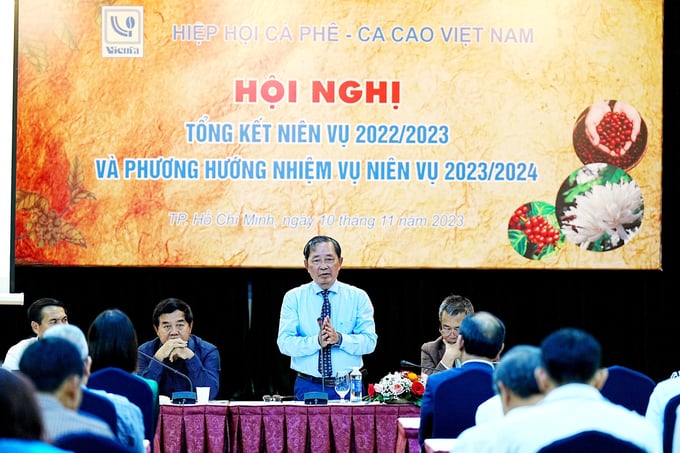
At the Closing Conference for the 2022/2023 coffee crop and directions for 2023/2024 held on November 10 in Ho Chi Minh city, the Department of Crop Production announced that the nationwide coffee production area has exceeded 710,000 hectares, surpassing the Ministry of Agriculture and Rural Development's original planning of 600,000 hectares between 2020 and 2030.
Vietnam currently ranks sixth globally in coffee production area (following Brazil with 1.9 million hectares; Indonesia with 1.2 million hectares; and the countries of Colombia, Ethiopia, and Ivory Coast, each with under 800,000 hectares. Thanks to Vietnam's highest coffee productivity globally, which is measured at 2.8 times higher than that of Indonesia, Vietnam achieves the second-largest annual coffee harvest in the world, ranging from 1.75 to 1.85 million tons.
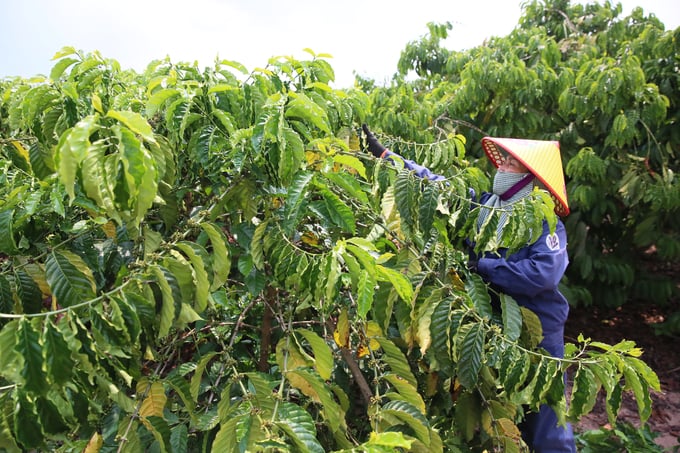
In compliance with new EU regulations regarding deforestation and forest degradation, Vietnam's coffee industry must demonstrate significant changes. Photo: Hong Thuy.
Within the total area of over 710,000 hectares, only 185,000 hectares of coffee production areas have been certified for sustainable production. These certifications include Utz Certified (Global certification for responsible coffee production and trading), Rainforest certification (Regulations for the development of global biodiversity conservation and sustainable development implemented by the Rainforest Alliance), 4C certification (Common Code for the Coffee Community - a global certification system for sustainable coffee cultivation and production), and VietGAP certification (Vietnam's Good Agricultural Practices). Accordingly, this is a relatively small figure compared to the uncertified portion of the total coffee production area.
Ms. Nguyen Viet Ha, Director of High-Level Sustainability - 4C Organization, highlighted that the Vietnam's coffee industry is facing numerous difficulties and challenges. Additionally, there is an urgent need for changes to comply with the new regulations from the EU and global markets, such as regulations on deforestation-free and non-forest degradation supply chains, supply chain regulations, greenhouse gas emission reduction regulations, Carbon Border Adjustment Mechanism (CBAM), and carbon credit certifications.
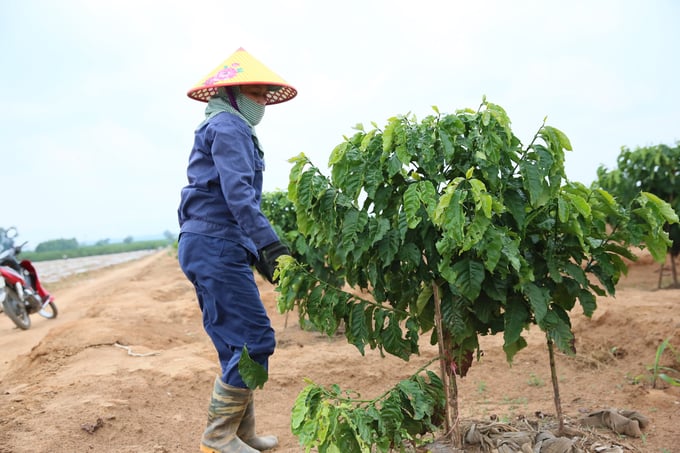
Vietnam has over 710,000 hectares of coffee production areas, with only 185,000 hectares certified for sustainable production. Photo: Hong Thuy.
On May 16, 2023, the European Union adopted deforestation-free and non-forest degradation regulations known as EUDR. According to these regulations, seven commodities including coffee, cocoa, palm oil, soybeans, livestock, wood, rubber, and related processed products such as timber, tires, frozen meat, printed materials, etc., will not be allowed to be imported into the EU market if the products are grown on deforested land since December 31, 2020. The EUDR took effect in June 2023, and by December 2024, they will officially apply to major corporations importing into Europe. Ultimately, these regulations will apply to small and medium businesses importing into Europe by June 2025.
Mr. Nguyen Nam Hai, Chairman of Vicofa, stated, "Regarding the regulations imposed by the European Union, Vicofa has held multiple meetings with the Ministry of Agriculture and Rural Development, the Sustainable Trade Initiative (IDH), the 4C coffee organization, and the Advisory Council for Private Economic Development to discuss solutions and support measures for businesses within the coffee industry. In addition, the Ministry of Agriculture and Rural Development has organized multiple conferences to implement EUDR. The Ministry has also cooperated with the Director-General of the European Union's Directorate-General for Environment on Vietnam's commitment to high responsibility for natural and environmental protection through the urgent implementation of EUDR and CBAM as specified by the European Union."
Coffee yield has been forecast to decline in the 2023/2024 crop year. Reports from the conference also revealed that current coffee export prices have reached its highest levels within the last thirty years, averaging at 2,682 USD per ton in September 2023. This is an increase of 17% compared to the same period in 2022. The average export price of coffee in the first nine months of 2023 reached 2,496 USD per ton, marking an increase of 3.8% compared to the same period in 2022. Moreover, domestic coffee prices have also reached a new peak at 70,000 Vietnamese dong per kilogram. The current domestic coffee price is averaging at 61,000 Vietnamese dong per kilogram, marking an increase of 68% compared to the end of 2022.
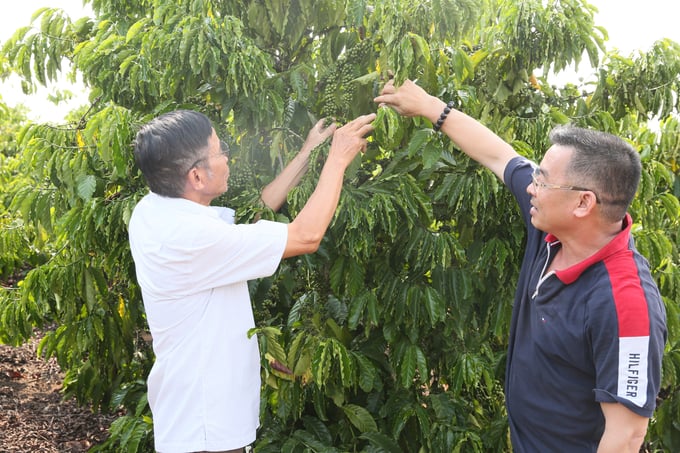
Vietnam's coffee export prices have reached its highest levels within the last thirty years. Photo: HT.
According to the General Department of Customs, Vietnam's coffee exports in September have reached its lowest levels with a volume of approximately 51,000 tons and a turnover of 169 million USD. This is a decrease of over 48% in volume and 28% in turnover compared to the same period in 2022.
Despite the high coffee prices, coffee yield has significantly decreased in the third quarter of 2023. During the first month of the new crop year in October 2023, Vietnam exported over 43,000 tons of coffee, which is 54% of the export volume in the same period in 2022. Total Vietnam's coffee exports for the first ten months of 2023 reached nearly 1.3 million tons with an export turnover of nearly 3.3 billion USD, marking a decrease of 11% in export volume and 1.2% in turnover.
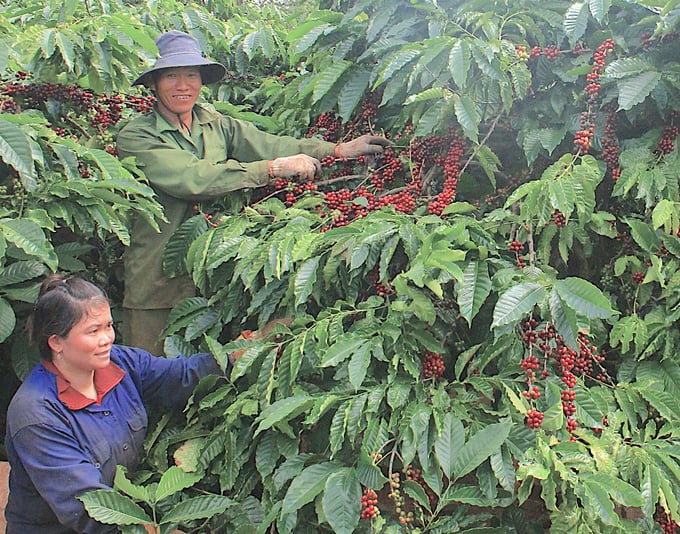
Coffee yield has been forecast to decline in the 2023/2024 crop year. Photo: Hong Thuy.
The 2023-2024 coffee crop is expected to suffer from a decrease of 10% due to the impact of climate change, increased intercropping areas, and farmers shifting investments into economically efficient crops such as durian and fruit trees.
Translated by Nguyen Hai Long

(VAN) Several scientists and farmers are experimenting with soil treatment in some key durian-growing regions such as Cai Lay (Tien Giang), Dak Song, Gia Nghia, and Dak R’lap (Dak Nong).
/2025/05/25/4127-3-073637_820.jpg)
(VAN) Thanks to the promotion from an FAO-implemented project, vegetable production in greenhouses in Moc Chau has seen strong development, from 1.5 hectares in 2021 to nearly 50 hectares in 2024.

(VAN) FAO has recently supported USD 140,000 to implement the project 'Risk mitigation human-animal interface risks through disease control initiatives in pig farming.'

(VAN) The People's Committee of Tra Vinh province has approved an adjustment to the investment policy for the Green Hydrogen Plant project, increasing its area to approximately 52.76 hectares.
![Reducing emissions from rice fields: [2] Farmers’ commitment to the soil](https://t.ex-cdn.com/nongnghiepmoitruong.vn/608w/files/news/2025/05/05/dsc08881jpg-nongnghiep-140632.jpg)
(VAN) Clean rice cultivation model in Thuong Tan commune, Bac Tan Uyen district, is assisting local residents in achieving sustainable agriculture by substantially reducing costs, increasing productivity, and protecting the environment.

(VAN) At the conference to disseminate Resolution No. 68, AgriS introduced its digital agricultural ecosystem and reaffirmed its commitment to accompanying the Government in promoting private sector development and sustainable agriculture.

(VAN) 'Blue Ocean - Blue Foods' initiative is designed to restore marine ecosystems and establish sustainable livelihoods for local communities by cultivating a minimum of 1,000 hectares of cottonii seaweed in the first three years.